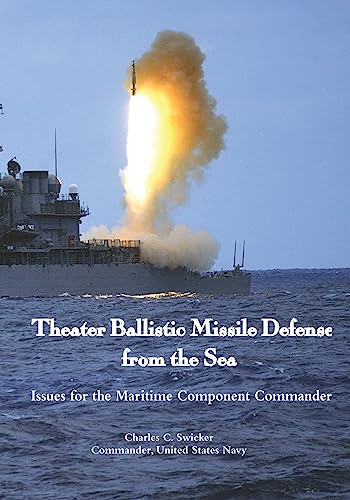Items related to Theater Ballistic Missile Defense from the Sea: Issues...
Theater Ballistic Missile Defense from the Sea: Issues for the Maritime Component Commander - Softcover

A sense of urgency informs “Theater Ballistic Missile Defense from the Sea: Issues for the Maritime Component Commander.” Theater ballistic missiles armed with chemical, biological, or nuclear Weapons of Mass Destruction (WMD) will be acquired and deployed by hostile forces in the developing world, posing an imminent threat to the U.S. and coalition forces that must operate in that world. The gravity of this evolving threat is recognized in our national military strategy. Army, Navy, Air Force, and Marine theater ballistic missile defense (TBMD) systems are also evolving, but with the exception of the Patriot PAC-2 missile system, none are yet fielded. Recognizing this constraint, this study looks ten years ahead, to 2008, toward the challenge of joint and multinational power projection operations against a TBM-WMD armed adversary. In such a regional contingency, the first TBMD-capable forces on the scene are likely to be naval. It will thus be the duty of the Joint Force Maritime Component Commander to plan, fight, and win the initial TBMD battle in order to enable the introduction of follow-on TBMD forces from the other Service components, as the campaign moves inland from the littoral. This study’s particular value lies in the attention it invites towards issues that concern the Joint Force Maritime Component Commander in his responsibility to perform the essential enabling task of delivering TBMD from the sea. This study is designed to raise more questions than it answers. With that purpose in mind, expeditious accessibility and wide dissemination are essential to facilitate further research—thus the specific intent to remain unclassified. The properly cleared reader, however, is encouraged to pursue potential areas of further inquiry at any appropriate level of classification, using the more than seventy military and non-military sources in the bibliography as points of departure.
"synopsis" may belong to another edition of this title.
About the Author:
Commander Charles "Chip" Swicker graduated from Dartmouth College in 1977. He then went to sea for five years in large, oceangoing sailing ships, including the clipper schooner “Pride of Baltimore” and the research vessel “Westward.” After receiving his commission from Officer Candidate School in 1982, he served in the Kidd-class guided-missile destroyer “Scott,” the nuclear cruiser “Virginia,” and AEGIS cruisers “Philippine Sea” and “Monterey.” Commander Swicker completed his executive officer tour in Monterey in the fall of 1997. In 1990, Commander Swicker received a Master of Science degree in Scientific and Technical Intelligence from the Naval Postgraduate School, where his pre-DESERT STORM classified thesis, "Countering Nascent Nuclear Capability with Conventional SLCM: Intelligence Requirements" received the United States Naval Institute Award. In 1995, he earned a second master's degree at the Naval War College, graduating with Highest Distinction and receiving the J. William Middendorf II Award for his Advanced Research Project, "Theater Ballistic Missile Defense from the Sea: Issues for the Maritime Component Commander." Commander Swicker is currently serving in a Joint Duty assignment as a Program Integrator for the Navy Theater Wide TBMD Program in the Ballistic Missile Defense Organization. He and his wife Gayle make their home in Vienna, Virginia
"About this title" may belong to another edition of this title.
- PublisherCreateSpace Independent Publishing Platform
- Publication date2016
- ISBN 10 153718413X
- ISBN 13 9781537184135
- BindingPaperback
- Number of pages122
Buy New
Learn more about this copy
£ 18.74
Shipping:
£ 8.95
From United Kingdom to U.S.A.
Top Search Results from the AbeBooks Marketplace
Theater Ballistic Missile Defense from the Sea: Issues for the Maritime Component Commander
Published by
Createspace Independent Publishing Platform
(2016)
ISBN 10: 153718413X
ISBN 13: 9781537184135
New
Paperback / softback
Quantity: > 20
Seller:
Rating
Book Description Paperback / softback. Condition: New. This item is printed on demand. New copy - Usually dispatched within 5-9 working days. Seller Inventory # C9781537184135
Buy New
£ 18.74
Convert currency

